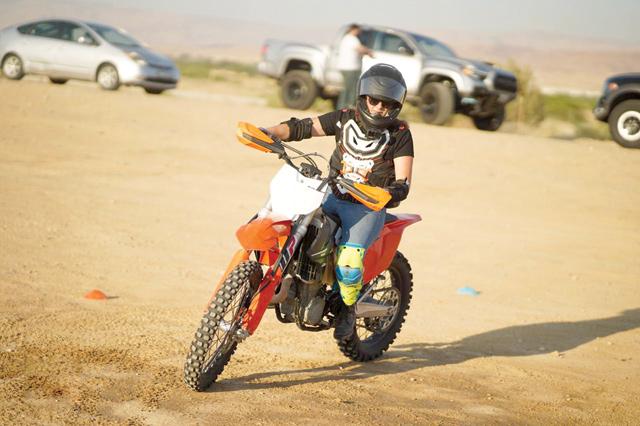You are here
Female motorcycle ownership in Jordan at all-time high
By Maria Weldali - Feb 25,2023 - Last updated at Feb 25,2023

As two-wheeler vehicles gain local popularity, female motorcycle ownership in the Kingdom is at an all-time high, according to a stakeholder (Photo courtesy of ‘Bidna Iyak’ initiative Instagram page)
AMMAN — As two-wheeler vehicles gain local popularity, female motorcycle ownership in the Kingdom is at an all-time high, according to a stakeholder.
Speaking with The Jordan Times on Saturday, founder of the “Bidna Iyak” initiative, Mohammad Zarka, said that “the motorcycle culture in Jordan is dynamic, and currently it has become a common thing to see on streets”.
The Bidna Iyak initiative aims to promote road safety awareness, support the Kingdom’s motorcycling community, and encourage other road users to drive cautiously and look out for motorcyclists. The campaign also advocates for a safer riding environment.
Women in Jordan often opt to buy scooters and motorbikes, while some buy sport bikes, Zarka said.
Recently there have been significant motorcycle sales in the Kingdom as the relatively low costs make it possible to finance two-wheelers. There are no monthly payments, unlike prior times, he added.
“Last year our initiative trained four professional female riders who competed in competitions that took place in different countries in the region,” Zarka said.
This year, the organisation is planning to train 10 new female professionals, he added.
"A new ladies motor club is to be established during 2023, in which female enthusiasts can learn new things that would help them get the most out of their riding experience," he said.
Around 60 per cent of the public in Jordan still consider women’s interest in motorbikes an act of nonconformity to social norms, according to Zarka.
The initiative is also planning to train delivery service motorists on road safety and awareness, he said.
There has been a drop in helmet use among two-wheeler drivers, particularly among delivery drivers who are largely new to riding scooters, Zarka said. And as for wearing other protective gear, despite awareness of the risk of injury, the compliance rate among all riders is moderate, he added.
“Today, there are at least 10,000 delivery scooters in Jordan. What is needed is non-traditional training for all motorists,” he highlighted. Unfortunately, motorcycle training centres give lessons on closed tracks, which will not teach future motorcyclists vital skills for navigating the Kingdom’s busy streets, Zarka said.
Related Articles
AMMAN — The Kingdom has witnessed a spike in the number of two-wheelers amid the COVID-19 pandemic, according to a representative of the mot
AMMAN — Women have been "increasingly" taking up motorcycling with females unlocking new dimensions in the riding experience, according to m
AMMAN — With the aim of shaping a healthy motorcycling scene and promoting road safety awareness in the Kingdom, the “Bidna Iyak” initiative













